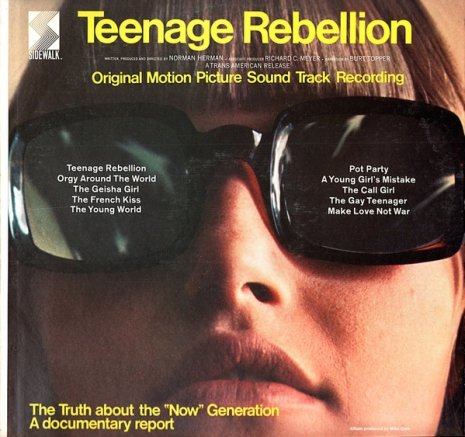
In the mid- to late 1960s, there was no shortage of attempts to explain what “the kids” were up to, an understandable impulse given that they were variously letting their hair grow out, protesting the illegal war in Vietnam, using the pill, smoking reefer, listening to the devil’s music, et al. In the past we’ve noted the tour buses that would wend their way through Haight-Ashbury so that the squares could gawk at the this new breed of hippie.
To be sure, the market for “concern about the youth” was so ripe that hardly anybody could louse up the opportunity. But then, some people are singularly talented. In 1967 an exploitation movie directed by Norman T. Herman was released about the kids that tried to have it both ways, hilariously calling itself Mondo Teeno for the kids themselves while targeting the concerned parents with the more chin-stroking title Teenage Rebellion. It seems that the wishy-washy approach of trying to be all things to all demographics backfired, as the movie made little impression on the moviegoing public.
Teenage Rebellion or Mondo Teeno, whichever you prefer, was a straight documentary of the type that might have appeared on CBS during the same period, with bracing footage of demonstrating teens and so on. Fascinatingly, the movie spawned a soundtrack that today is a surefire guarantee of amusing background music for any social gathering—some of the tracks feature Burt Topper’s overwrought narration, some don’t, but all feature perfectly good, often psych-tinged music from the era. It’s as groovy and funny as only a super-“serious” “expose” of 1960s youth culture can be.

The movie appears to have been structured as a tour of youth culture, with sections devoted to drug use, homosexuality, the anti-war movement, and on and on. The introductory track, “Teenage Rebellion,” is perfectly riveting chunk of garage psych courtesy of courtesy of Davie Allan and the Arrows, and “The Gay Teenager” unexpectedly uses a rousing string arrangement not unlike something from Serge Gainsbourg’s Histoire de Melody Nelson, which came out four years later.
Norman T. Herman’s only other directorial credit is the 1959 potboiler Tokyo After Dark; most of his IMDb page is taken up with exploitation fare like Bloody Mama. In For One Week Only: The World of Exploitation Films, Ric Meyers says with some regret, “The 1960s were a turbulent but important decade. It’s too bad that films like this make it look ridiculous.”
One of the noticeable credits on the soundtrack is Mike Curb, who both produced the album and composed some of the music. Curb is a fascinating figure who had a hit called “Burning Bridges” as the Mike Curb Congregation (!) which was used in the 1970 Clint Eastwood joint Kelly’s Heroes and he later ran a label called MGM. In 1970 Curb made a splash when MGM dropped 18 acts because of drug use (!!).
Much more after the jump….......





